“I like to take my mysteries layer by layer,” I explained.
“Like an onion?” He snorted. ~ TWMF:920

This is part of Warrens series and follows A Crown of Broken Glass. If you came here just for the translation, and want to skip the journey to get there, navigate to Expecting Disaster. The goal here is to discover the meaning of our red headed innkeeper's new name, "Kote". This has been discussed nearly to death. But me and Vashet like to make our own judgments, and that means putting in the work.
Advice from an old tracker. You want to find someone? Use your eyes. ~ Mal (Serenity)
So I'm going to scour the books, trying to translate far more then the word Kote, we will end up making wild guesses, it will be exhaustive and exhausting. However, in the end, we will find ourselves in the heart of a maze with no clear answer, and it will look a disaster.
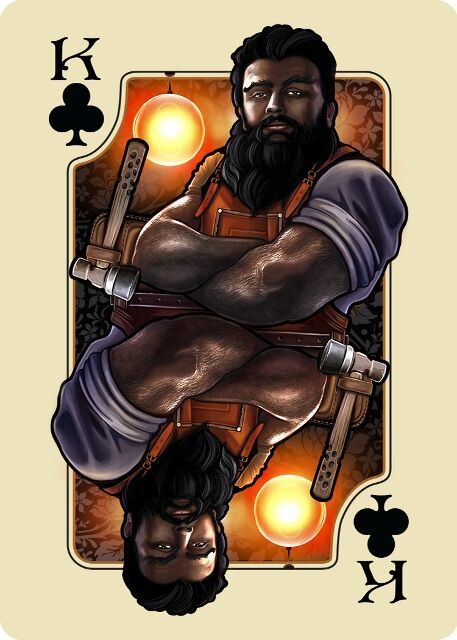
The word "Kote" is used twice by Kilvin, and it's from there our journey should start.
"Kist, crayle, en kote," he swore furiously. He threw down the metal tube where it rang sharply against the stone floor. “Kraemet brevetan Aerin!” ~ TWMF:171
Kvothe's Siaru isn't perfect, but he thinks Kilvin said "Shit in God's beard". The comma at the end of the first phrase might indicate one continuous expression from Kilvin. A usage Grammarly describes as Comma between direct quote and attribute tag. We get examples right away in NOTW e.g
"Hush now, you'll get all the answers before the end," Jake said. "Just let him tell it."
"No need for all that, Jake," Graham said. "Boy's just curious. Drink your drink." ~ NOTW: 3
Furthermore, Kvothe might only be pulling out words randomly and piecing them together. This means it's likely our set of words ranged the whole 7 words Kilvin uses. to make you love him. This is going to be challenging and involve some guesswork.
"Kote" is used again by Kilvin when talking to Kvothe:
"I am," he said cheerfully. "Do you know the saying 'Chan Vaen edan Kote'?"
I tried to puzzle it out. "Seven years ... I don't know Kote."
"'Expect disaster every seven years,'" he said. "It is an old saying, and true enough. This has been two years overdue." He gestured to the wreckage of his shop with a bandaged hand. "And now that it has come, it proves a mild disaster. My lamps were undamaged. No one was killed. Of all the small injuries, mine were the worst, as it should be." ~ NOTW:475
Before we get started decoding this, let's take a moment to reflect that if Kilvin is listing things in order, he values the lamps over lives. But let's not get distracted. We have to assume Kilvin would have corrected Kote if he got the first part wrong. Furthermore, even if it's not a direct translation, Ben tells us that "Chaen" means seven. Vaen is close to Kaen, an older version of Tak and faen, what Bast suggests we call fae creatures. Through, how either of those words would relate to the Siaru word for years is unclear, and I think the similarity likely just a conscience. More unsettling is a word with nearly the same pronunciation, "veyan" used by Bast while acting like he is being danced:
He looked down at his hands curiously, then dropped the half-finished circle of holly onto the bar. His grin slowly faded to a blank expression, and he looked around the taproom dully. “Te veyan?” he said in a strange voice, his eyes glassy and confused. “Te-tanten ventelanet?” ~ TWMF:15
It's hard to see what question he could be asking here if they have the same meaning. "Te years?" maybe "What Year?", maybe "What year is it?" A good question if you find yourself suddenly inhabiting a human body. The other options are just as hard to fit: "Te/what disaster?" or "Te/I expect?". This is further confounded by the fact Bast is acting and knows Chronicler doesn't speak the language. I suspect Te to mean "I" or "you". Though it's worth mentioning the rune for lock is teh, which means it could lean towards phonetically towards look. The Ademic use of "Sceope Teyas" translates to "I'm not speaking", given our favorite narrator Skarpi is quite the speaker, Sceope is likely Speaker leaving Teyas to cover "I'm not", so we might lean towards "I".
The real skin-dancer used the words "I" and "Looks" a lot when it spoke Aturan: "I... am... look", "I look" and "I am looking..." so when it switches to faen its reasonable to assume it says both again:
He smiled wide at Chronicler, all the vagueness gone from his expression. “Те varaiyn aroi Seathaloi vex mela,” he said in a deep voice.
“I ... I don’t follow you,” Chronicler said, disconcerted.
The man’s smile fell away. His eyes hardened, grew angry. “Te-tauren sciyr-loet? Amauen.” ~ NOTW:663
So the chances of Te being "I", get raised a bit. Also, Amauen is likely "Look". Keeping that in mind might help settle a dispute will run into later. But nothing is conclusive, we just don't get enough to work with. Another argument for Vaen being related to time is that the first seven days (the original week) have the suffix "-en". e.g "hept-en".
So we can safely narrow down the options.
I'm guessing we don't need to worry about every as hopefully it's implicit. But for just the other two words we will have to dive into a labyrinth of other phrases, words, and parts of the language. So let's tackle "Kist" first, which is used several times and always as part of a curse:
"Kist, crayle, en kote," he swore furiously. He threw down the metal tube where it rang sharply. ~ Kilvin TWMF:171
"Kist and crayle," I said, my own heart racing. "What's the matter?" ~ Kvothe TWMF:244
Kist," he swore, then headed back outside, the door banging behind him. ~ Cealdish looking mail man TWMF:314
the word Furtherence. Furtherance. Kist. You know what I mean. ~ Denna TWMF:315
ever heard from her before. "Kist and crayle, I hate that Goddamn play. Modegan faerie-story trash. ~ Denna TWMF:486
If we had to choose a word from our set {shit, in, god, beard}, we should lean towards "shit". Given Kist and Crayle are only ever used in curses, it would be nice to check a list of curses, to make sure nothing pops out as close:
| Curses & Insults (Not comprehensive) | Who |
|---|---|
| Blackened body of God | Jake |
| Blood, bracken, and bone | The Cthaeh |
| Blackened, sodding damn | Kvothe |
| Charred body of God | Kote |
| Damn my blackened luck. | Threpe |
| God. Blackened. Damn. | Kvothe |
| Great Tehlu overroll me with your wings | Martin (slighty more of a prayer) |
| God's grey ashes | Sim |
| God’s balls | Sim |
| God's mother | Sim, Devi, Jason, old man from Krins town, Kote |
| You don't have the sense God gave a dog | old man from Krins town |
| lord and lady | Bast, Graham, Aaron, Cob, Kvothe, Stapes, Maer, Devi, Elodin, Dal. |
| Merciful Tehlu | Bast, Manet, Sim, Kvothe, Devi, Denna |
| Mother of God | Graham speaking to Carter |
| Mothers milk | Kvothe? |
| Shit in god's beard | by kilvin translated by kvothe |
| Shit and onions | Vashet |
| Tehlu anyway | Graham, Shep, Manet, Kote |
| Tehlu's tits and teeth | Kvoteh, Devi |
| Tehlu crush us | street urchin with pike |
| Tehlu and his great glowing penis can piss all over me | street urchin with pike |
| Tehlu hold and overroll us. | Denna |
| Tehlu hold and— | Devi |
| Tiny gods | Bast, Kvothe, Threpe |
| You’re thick as a post | Cob |
| You twiggy little skeeth. | Vashet |
| Shut your clepper, you old shit-fire | major's body guard |
| Punched a tinker? | kote. (ok not a curse but a I love this line) |
| She hoped the greedy thing shit for a week. She hoped it shit its awful self inside-out and backward, then fell into a crack and lost its name and died alone and hollowempty in the angry dark. | Auri |
| “Trouble me no longer! I will set fire to your blood and fill you with a fear like ice and iron!”There was something familiar about his words, but I couldn’t put my finger on it. | Ben |
| “I’ll turn you into butter on a summer day. I’ll turn you into a poet with the soul of a priest. I’ll fill you with lemon custard and push you out a window.” He spat. “Bastards.” | Ben |
| “Ambrose, your presence is the horseshit frosting on the horseshit cake that is the admissions interview process.” | Kvothe |
| “That hat makes you look like you fancy young boys, | Kvothe |
| Were you born in a barn?” | Sim |
| “Mine is to make insults. Yours is to be in-sluts.” | Wit (how did you get here?) |
| you little ravel bastard | Hemme |
| “You stupid shit-eater, he saved us. | Krin |
| A dog can bark three times without counting. | Carceret |
| “You speak as a dog barks,” I said. “With no end. With no sense.” | kvothe (ademic insult) |
Note lord and lady seems used frequently in Newarre, The Univerity and in Vintas. Meanwhile only Manet at the university uses "Tehlu anyway". A point in favor or Newarre being near the University as I write about in How to get to Newarre.
Any of these words might play a role, but nothing contains "beard", and so we don't have a potential direct link. "Kist and crayle" might translate to "Shite and Onions". An expletive attributed to James Joyce's piece Gas from a Burner. We even get the proper version with an e at the end from Pike cussing out Bast:
“It’s a shite rule!” the boy shouted, his hands making angry fists. “And you’re a shite little bastard who deserves more of the belt than he gets!” ~ TLT
Given we just suggested that "shit" substitute well for "Kist" in all uses. Crayle never appears on it's own, and its similarity to scrael is exciting, but nothing substantial comes of it. Kote does compare the scrael to a mushroom:
The innkeeper nodded to himself as he continued to prod the thing. “There’s no blood. No organs. It’s just grey inside.” He poked it with a finger. “Like a mushroom.” ~ NOTW:256
If Crayle shared a root with Scrael and they were both in fact mushroom's, and Kist was onions, this would leave us with the popular dish onions and mushrooms. However, I don't see why everyone would be using Onions as a curse by itself. e.g "Onion. He swore" Though I suppose mushrooms do grow in shit. Furthermore, you can't spell crayle without cry, which onions are well knowing for inducing. While were on a tangent, let's mention that onion's have another relationship with our breaded master through the latin Annianus, which was associated with Welsh einion "anvil". A metalworking tool that features predominantly in Kilvin's workshop, though he was glass blowing at the time he issued the curse in question.
Switching lanes, "en" is used twice by itself "En Temerant Voistra" making it a candidate for "the" or "In". Temerant sounds shinny, and "Voistra" sounds reminiscent of "avoi" which our skin-danced friend seems to use for "look/see" or maybe "want". So "En Temerant voistra" might be "A look into Temerant". "en" also gets a brief mention by our pig farmer friend as a substitute for "in" in the phrase "wool en tae mouth..." So if we had to bet, en=in.
It would be nice to guess at what "Kraemet brevetan Aerin" means. AE appears in several critical words and is worth discussing on it's own. Check the last section of for a list of every word that has ae in it, There are a lot.
Visually, Æ tells quite a story. To me æ looks like an infinity symbol, a circle turned against itself. This and other ideas I found in the story has lead me to view the Fae like this This. Two circles could also be considered an Annulet, as could just one. I talk about Annulets as it related to the story here. When you draw the letters so they connect you seem to get an H:

The Staff of Aescuapis, associated with healing and medicine, is serpent entwined rod. It's often frequently confused with the staff of another god Hermes, the caduceus, which among a host of other things is associated with resurrection.
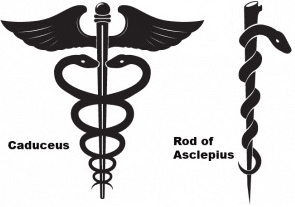
So despite Basts urging that all snakes bite, it seems the Greek's at least thought some of them promoted healing.
Next let's consider the phonetic history which paints its origins to look this:


They look like a tinker and donkey to me. One map even gives the tinker little horns, how cute:
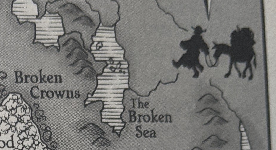
They also are the first two letters of Aesop's tales, here is one picked at random: The North Wind & the Sun and the games they play. This book can found on the Princess bookshelf in the book "The Princess & Mr. Whiffles: The Deep Dark Below."
AE seems like it's all over, but how what value do we assign it? Gran might have a good idea about how to think about AE. Arrowroot hain't a palliative of any sort. It's just good at carrying around what works.". If I were looking for a neutral God, it would be AE. Which means either of these two, "Kraemet" or "Aerin", might have been the one Kilvin was talking about. Let's start with all the usages of Kraemet:
"Kraem. No. Not like this." Kilvin growled out a couple words and pounded his fist on the table, each thump as his hand came down was accompanied by a staccato burst of reddish light that welled up from his hand. "No sympathy. I do not want an ever-glowng lamp. I want an ever-burning one." He looked at me again showing his teeth, as if he were going to eat me. ~ NOTW:244
"Only nobility," Wilem said. "Kraemlish bastards with no business having their study here. I think they stoke up high tuitions just so they can complain." ~ TWMF:254
"Kraem no," Wilem said. "He can't go to the Medica. They will be asking to see if anyone is hurt." ~ TWMF:165
against the stone floor. “Kraemet brevetan Aerin!” ~ TWMF:171
Wil looked down at the tabletop. "Kraem," he said. "It makes sense. ~ TWMF:220
If you're from Yll your "yllish" so "-lish" might be a suffix meaning "people of". This would make our curses:
All of which work rather well. Though I suppose "shit" and "shitless" do to, but that's firmly in second place. It's possible "K-" is a form of negation or negative. The short argument for this comes from this exchange:
I felt Master Elodin look at me. Actually felt it, I suppressed a shiver. "So-heketh ka Siaru krema'teth tu?" he asked. How well do you speak Siaru?
“Rieusa, ta krelar deala tu.” Not very well, thank you. ~ NOTW:245
Given re'lar means "speaker", it seems to be that we just slapped a k on it to negate it. And so Kraem could be the negated/evil/bad god. But I don't think we need to go down that road, other than to say it uses suggest it could be a god.
At best, I can say that Brevetan might share a root with our white-bearded Tak player Bredon. The suffix "-tan" is used in "quetentan~question" and "ketan" both are curious words, but neither leads me to any great insight. It could be used to modify the noun, so cutting it off might leave us close to the core, which is all we need here. "breve". It sort of looks like it might want to be beard. Or even better beaver, which could have been transferred from the early meaning "a bearded man" before it got it's more popular meaning (or it's double entendre).
Lot's of potential fun can be had with "Aerin" It has our isolated AE + rin. If AE is the wind, then what should be considered anything close to rin? rhintae|rhinta|rhin|rhinna|rhinata|rainbows ok.. the last one is silly.
One story even mentioned rainbows. Who would write that? Why make a child terrified of rainbows?. ~ TWMF:128
Silly, like drawing attention to how its only a v away from Verian, which is tiny red flower. One which kvothe mentions in relation to Verainia Greyflocks name, which he pairs down to "nina". In a Spanish context, Niña means "child". It's often a female name. It's also a short hop to NIN. Which is clearly visible intermixed in with Wind:
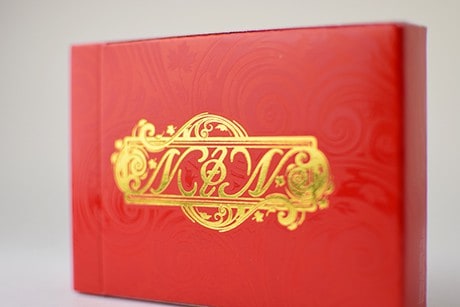
In Sumerian, Nina means "queen", "lady" "lord". Gods above, lets not even mention that it's occurrence in the name of Ninsun, (formal meaning "sun"), the mother of Gilgamesh, especially in the flood myth. Though I think the commonalities between the myth and what will be limited to a flood representing a destructive event as prophesied by this line in the Lackless poem:
One a door that holds the flood
I can't help but wonder if the four plate door might not have cracks because it's water tight. Also, how far deep underground is the four plate door?
The next day Fela skipped her lecture on Advanced Geometries and made her way to the Archives. She climbed down several flights of stairs and through a maze of corridors and shelves to find the only section of stone wall in the entire building that wasn’t lined with books. The four-plate door stood there, silent and immobile as a mountain: Valaritas. ~ NOTW:677
And how would it line up with Auri's Pool, The ever changing Twelve? The one she dives into like a fish bringing back treasures like bones, buckles, fulcrums, etc...
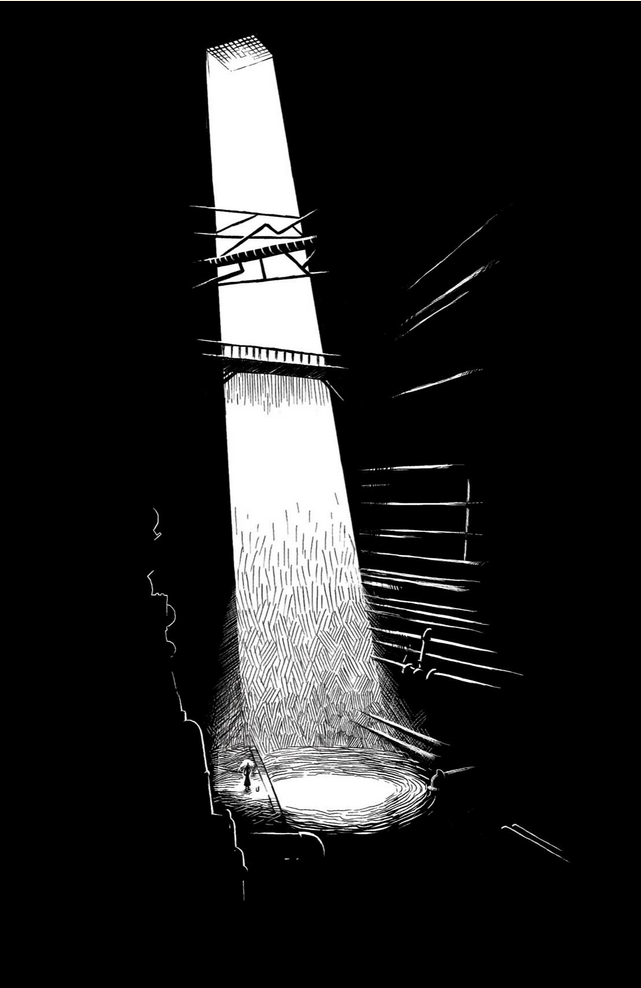
But lets get back on topic, "Nina" in a Russian context is a shortening of Annina, diminutive of Greek Anna, which is short for Annabelle, Kvothe first guess at the name for Denna's patron. I'm sure Kvothe could think of one sunny little girl in his life, but we can't go around connecting her to Denna's patron because of some hackneyed romp through etymonline.com Madness. What's next, suggesting she is a god?
Listen, strange women diving into ponds, distributing bones and crystals is no basis for a system of creation. Supreme theoretical insight is gained by a comparison of the legends, not from some farcical aquatic ceremony.
You can't expect to wield supreme magical power just 'cause some watery tart gave you a key, kiss and candle.
I mean, if I went around saying there were nine chandrian, simply because a moistened modor tossed giant iridium gear on a chair, they'd lock me away!
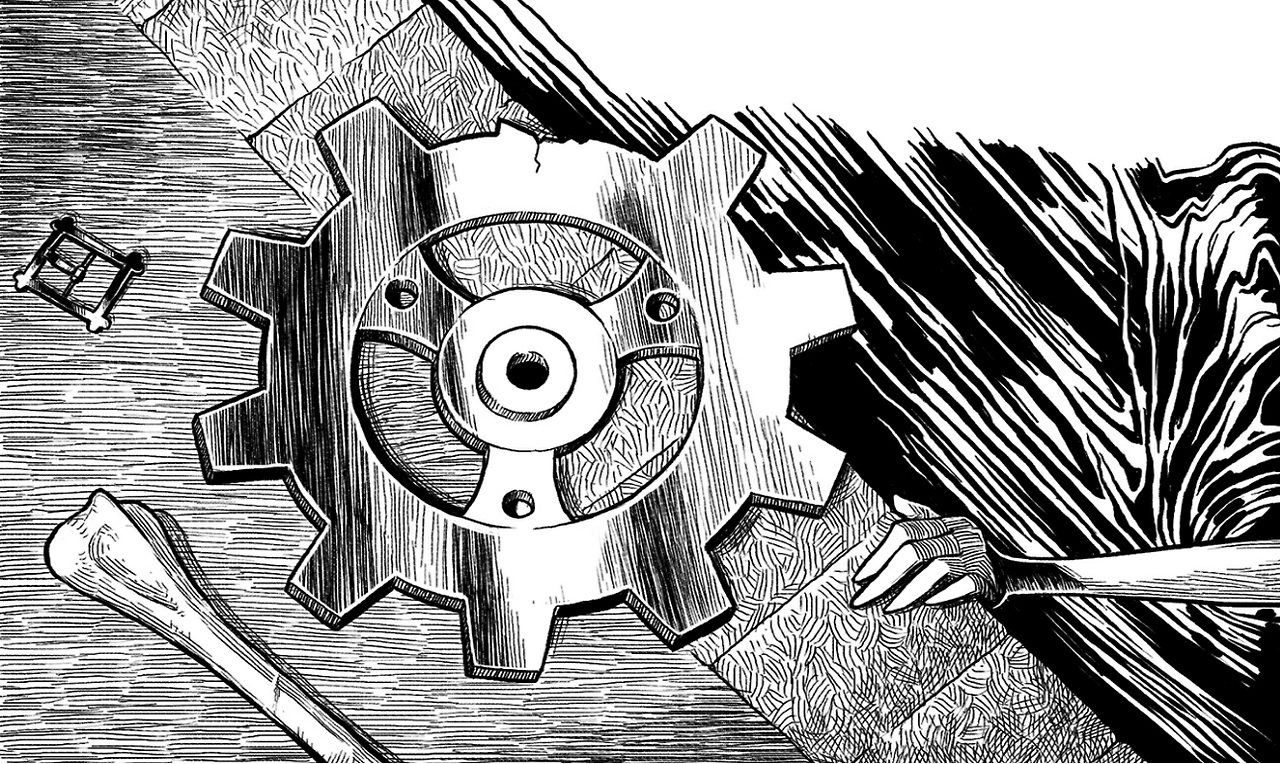
I'm sorry, what were we doing again? Oh, yes.
“Kraemet brevetan Aerin!”
So like Encans is Tehlu, were not sure if we have one god or two gods and potentially a brevetan|barber|beard in the middle, trying to cut a beard. Or shit in it. Not much help in either case in translating Kote, but maybe we had our eyes opened to some new ideas. Or been scarred, take your pick.
Edan makes an appearance in a sentence that's even harder to translate:
"Tetalia tu Kiaure edan A'siath," he said in Siaru, clapping Wilem on the shoulder as he walked out from behind the desk. "Vorelan tua tetam." ~ TWMF:427
And while I see some interesting words in there namely A'Siath potential meaning something close to Sithe, which would only work if my interpretations in A Crown of Broken Glass are correct. Why not take another detour and look into this little mystery some more.
But let's examine some further supporting evidence between the Scrivs and Sithe. The Sithe were known has hunters:
Bast shrugged. “I’m running dark on this myself, Reshi. I know the Sithe used to ride out wearing holly crowns when they hunted the skin dancers. . . .” ! ~ TWMF:13
Kvothe describes the Scriv Viari, who works in acquisitions, as a hunter:
A tall, lean Cealdish man opened the door behind the entry desk. Unlike most Cealdish men he was clean-shaven and wore his hair long, pulled back into a tail. He wore well-mended hunter’s leathers, a faded traveling cloak, and high boots, all dusty from the road. As he shut the door behind him, his hand went unconsciously to the hilt of his sword to keep it from striking the wall or the desk. ~ TWMF:427
In the book "History of Tak the fictional narrator is a Scriv:
The Road to Tinue: A history of Tak .... Re'lar Daramin Centes Esq. Fourth Tier Scriv. Order of the Yew
This implies that their are multiple ranks of Scrivs, and so like the university ranks (e.g re'lar), the Archives might have it's own set of secrets you become privileged to as you rise up, one of which could feasible be the fact that their organization has historical connections with the Sithe. A Yew is species of trees, where most parts of the plant are poisonous, potentially deadly. And while the Cthaeh was a willow, it's advice is toxic. The Yew is also considered symbolic of death and immortality, potential mirroring the dual nature of the Ctheah's poisonous tongue with it's panacea flowers. Though, I'm sure we can find quite a few tree's with mythologies that match the Ctheah in some form. While the sithe are typically connected with the Holly tree, which certainly isn't a Yew, they share a lot of similar characteristics, such as they both have bright red berries which are poisonous. Holly left and Yew right:
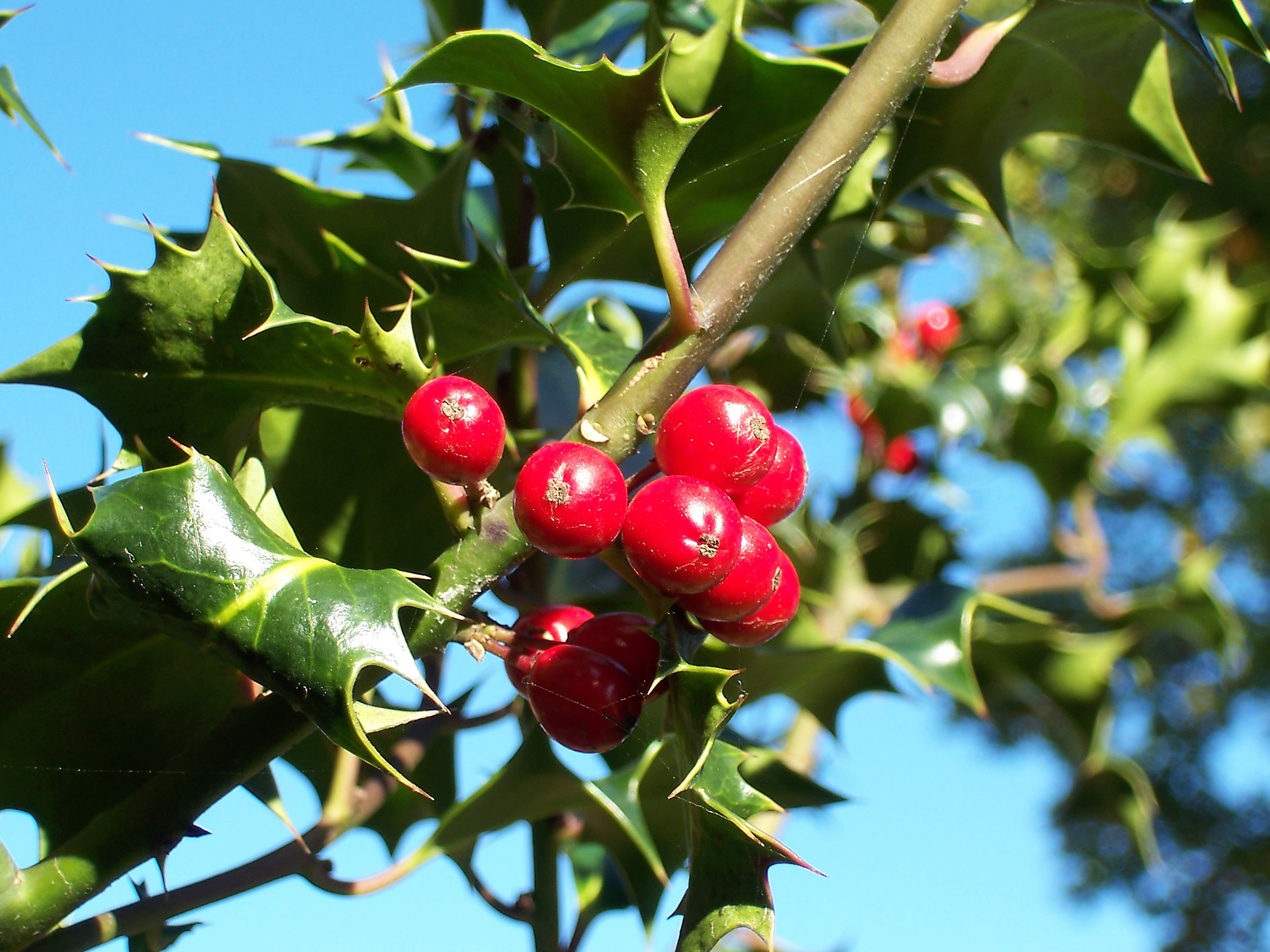
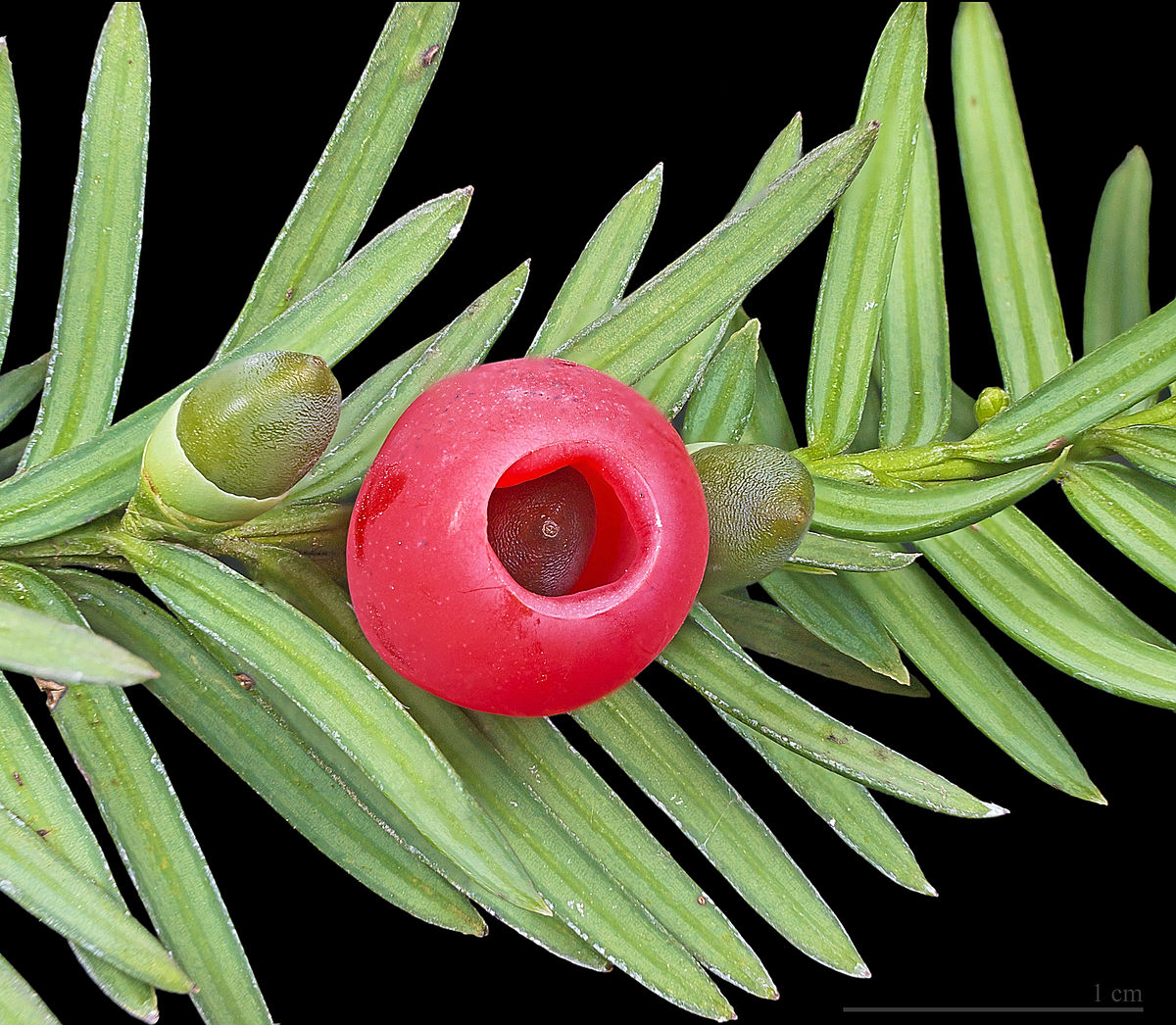
What's more, Yew is a preferred would for making bows.
Wood from the yew is classified as a closed-pore softwood, similar to cedar and pine. Easy to work, yew is among the hardest of the softwoods, yet it possesses a remarkable elasticity, making it ideal for products that require springiness, such as bows
It's even associated with Longbows even...
w is also associated with Wales and England because of the longbow, an early weapon of war developed in northern Europe, and as the English longbow the basis for a medieval tactical system. The oldest surviving yew longbow was found at Rotten Bottom in Dumfries and Galloway, Scotland. It has been given a calibrated radiocarbon date of 4040 BC to 3640 BC and is on display in the National Museum of Scotland. Yew is the wood of choice for longbow making; the heartwood is always on the inside of the bow with the sapwood on the outside.
Which Bast tells us the Sithe are fond of
If anyone manages to come in contact with the Cthaeh, the Sithe kill them. They kill them from a half-mile off with their long horn bows. ~ TWMF:689
Traditionally, "horn bow" means a bow that incorporates horn, so it would traditional still use wood. An ottoman hornbow, compare it to the bow in the picture below.
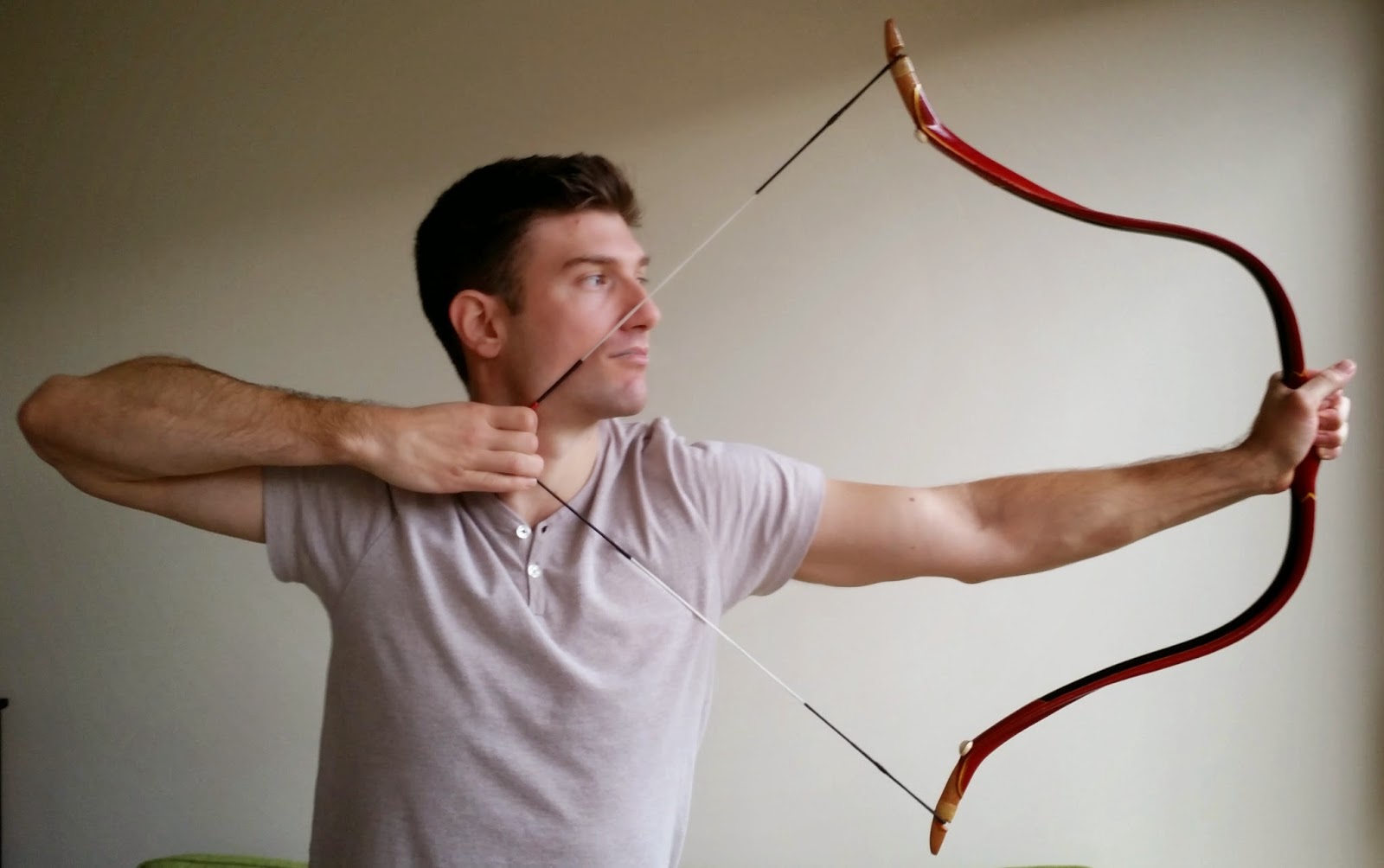
Historically, people also made the arrows from the Yew Tree because of it's toxic properties. I feel like the trunk pattern on the Yew tree is similar enough to what we see featured on the Modegan pairs deck:
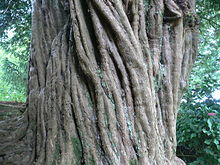
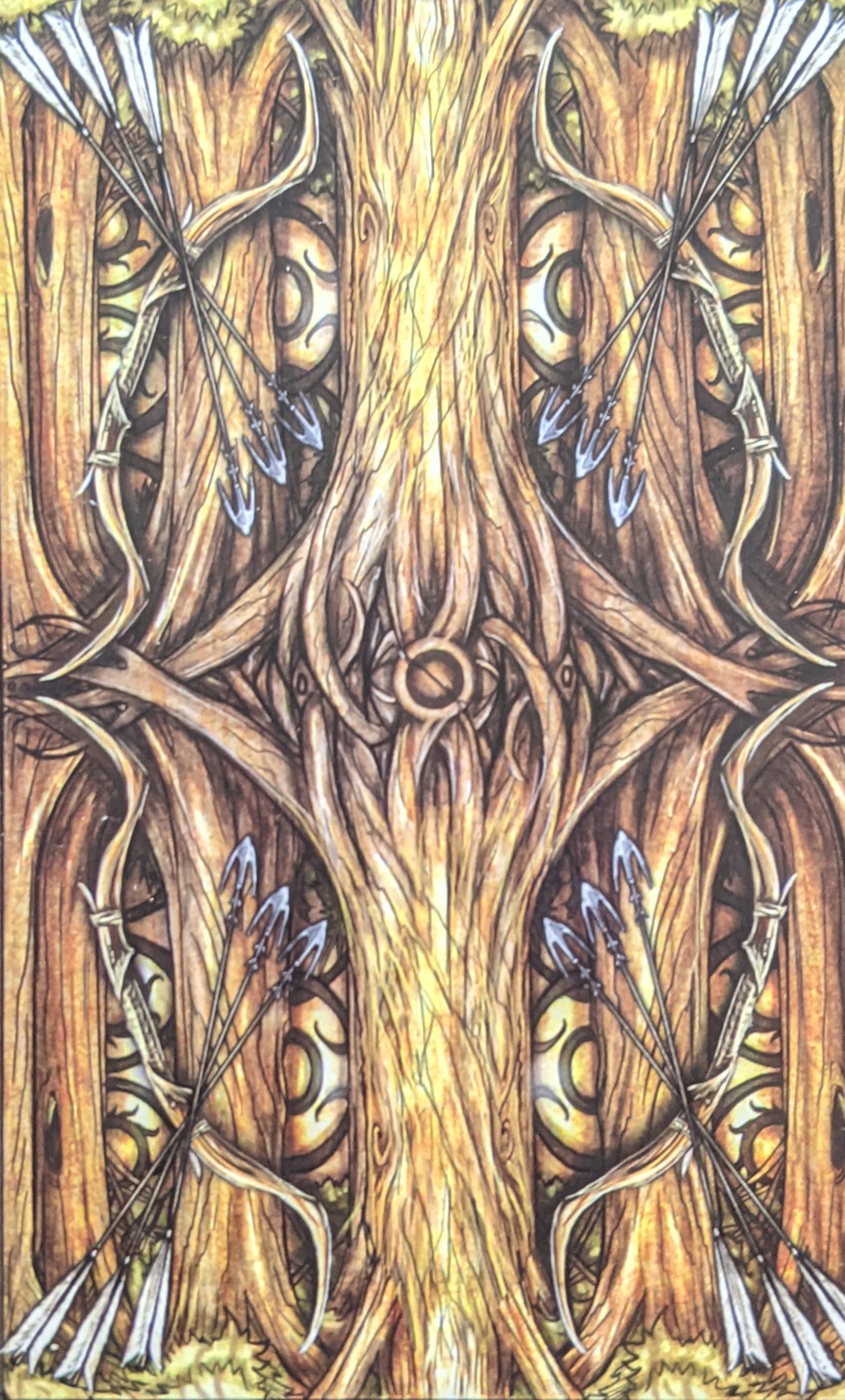
And the Sithe and Lorren are very serious about their charge. To round this out, If order of the Yew, isn't related to the Ctheah, then it might be a reference to another mythological tree, or tree dweller. Potentially even the world tree.
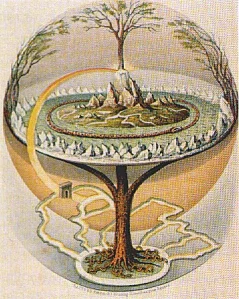
Eventually, I'll move this work on the yew to it's own section and flush it out more. For now let's get back to figuring out what kote means.
Another word close enough to Kote that we should consider is moteth, which is muttered by Denna when drugged and half asleep:
“Moteth?” she muttered around a mouthful of sleep, her eyes barely moving under her lids. ~ NOWT:610
I can't let go of the idea that if you remove the common words from moteth and something you get sing. Though what that means, I can't tell you. The suffix of the word -th is quite common.
-eth could be a form a possessive. e.g "your one sock", "you speak...", "your family", oketh ~ "your eye..."|"your... madness", etc. Regardless, we can strip it out to find the noun, Mote. Which is a letter away from Kote. Mote means dust visible in a ray of sunlight, in the archaic it means Mighty. It's also potentially the origins of the word motley which means variegated in color. Only one being holds the mantle of mighty and is possessed of many colors, the one and only Taborlin the greeeaatttt!. Which is a name I plan on trying to unravel shortly. Also if -eth mean possession, then the use of the teeth in "Tehlu's tits and teeth" might have an alternative meaning te-eth, If "Te" is I and "eth" is possession then te-eth could mean self mastery. Auri and the Bene Gesserit understand the importance of self control. Auri's fulcrum has 10 teeth and one is broken, maybe a representation of the one who couldn't control themselves? Or again if Te is "you" te-eth could be mastery of another, maybe one who wasn't mastered?
One phrase that wouldn't seem relevant at first glance but is likely the fulcrum to this mystery is
“Tuan volgen oketh ama.” I said, using one of my favorite Siaru idioms. It meant 'don't let it make you crazy' but it translated literally as: 'don't put a spoon in your eye over it.' ~ NOTW:287
I'll claim two of these words are easy to identify. "Tuan" ~ "your|you|dont you". Sharing a root "tu" as used in "tu ketha" ~ "are you coal". The other is Volgen which longer and so likely fits to spoon. This leaves us with "oketh" and "ama" one of which needs to function as "in eye/in one eye". This ends up being quite a challenge. ama would be a good candidate for eye given there both three letters.
It's also the first three letters of amauen which is used three times (but really just two):
The man’s smile fell away. His eyes hardened, grew angry. “Te-tauren sciyr-loet? Amauen.” ~ NOTW:663
Given how many times the skin-dancer says looking, it's safer to fit amauen to looking even without the other connections raising the probability of it being correct. We also see it used in Felurians song:
Cae-Lanion Luhial
di mari Felanua
Kreata Tu ciar
tu alaran di
Dirella. Amauen.
Loesi an delan
tu nia vor ruhlan
Felurian thae.”
~ TWMF 631
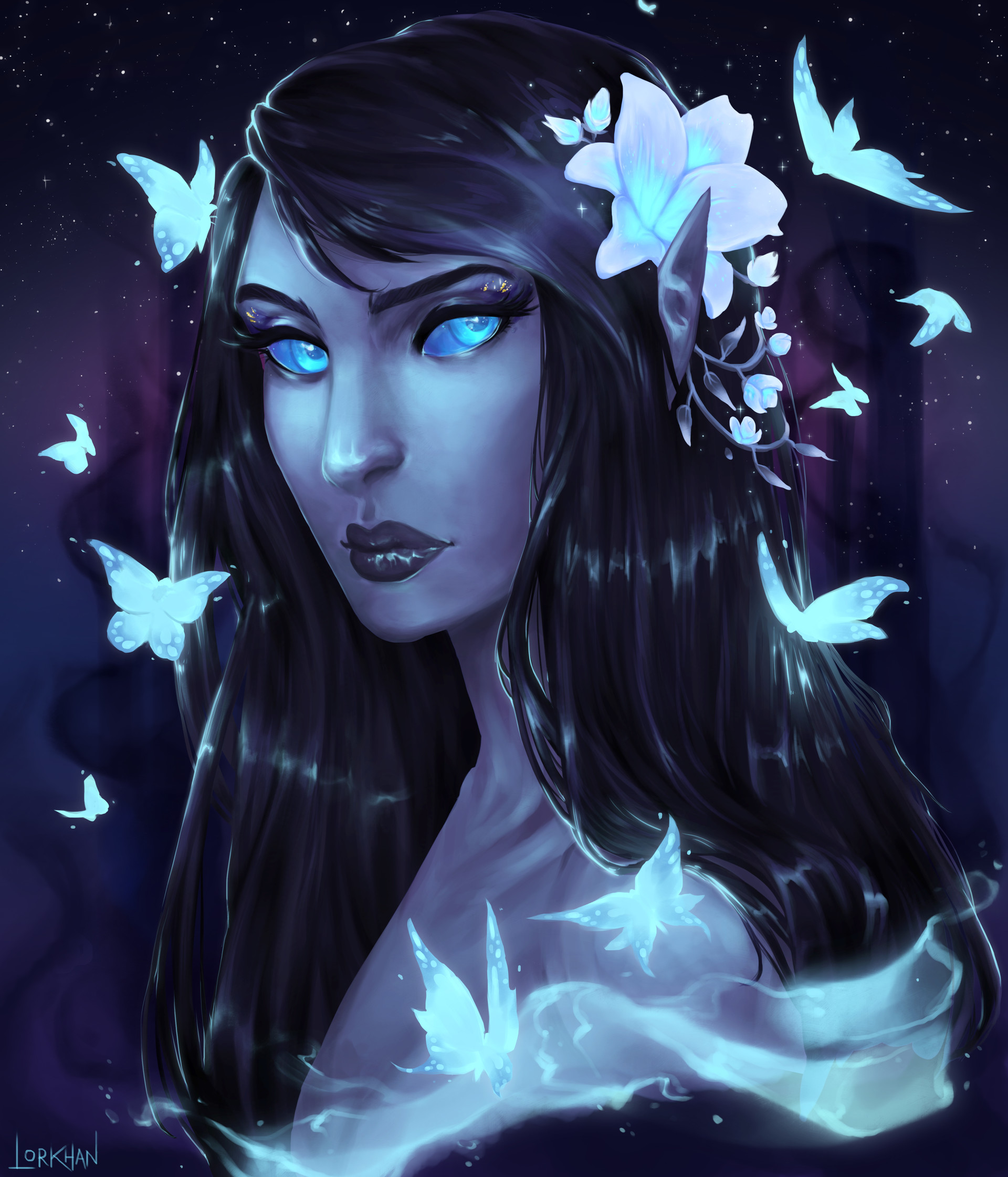
I had a hard time with this one so I called Felurian and she helped me out:
Come to the seven's mansion, the moon's home.
Chance married or marred, beautiful and broken
You a sweet flickering candle flame
Your love fleeting
We're separated. Look.
Earth and sky
You of the Ruh, of the land
I of the sky, the beautiful moon tree's flower
Their are a couple other faen words that start with am-, notable amouen, which is used twice by Felurian:
She looked down at me, her expression proud and regal as a queen. "amouen," she said, spreading the fingers of one hand and making a deliberate gesture. "this we call the hushed hart. an easy lesson to begin, and one I expect you will enjoy." ~ TWMF:654
and
Felurian smiled indulgently. "you are my precious newborn lamb. look! there hangs a cloud as well! amouen! dance for joy!" She laughed. ~ TWMF:669
It leans slightly to "look" but is shares more letters with "sound/listen" or maybe a child of both meaning pay attention. Given what we derived from other phrases, will have to assume Felurian's use of the word Amouen means "listen", after all, Kvothe didn't have any trouble looking at her. Here is a bit of a graph to try and pull together some of the Fae A- words and their origins:

Additionally, "oketh ama" could together be "one dark eye" the idiom now clearly a reference to Skarpis story about Selitos. "Keth" itself seems to share a root or similarity with "dark/black/coal" considering "tu Ketha" being close to "are you coal". The Tinker tells us that "ket-selem" would be "first-night" and "keth-selhan" would be "one sock" the root "ket" seems to be first. Then "keth" ~ "one". which would seem to fit with oketh being close to one and ama being eye.
The reason for considering these words is because Kote isn't to far from keth. We were left with a bit of a choice. Is oketh eye or is ama? I'm leading you down this road because I think this confusion is planned. This is the deeper mystery beyond considering if Kote's life was a disaster. Is he a hero, the "one" maybe a God? And more importantly, what does it mean to be a god. They're all around us, why comment on one more when he can't even seem to fight off two mercenaries.
Or maybe the is closeness to keth hints he was the villain of coal~ash all along? Words are pale shadows of names and Bast hints someone truly powerful could take a shadow and... what? Make of it a curse? Use it to keep them safe? I don't believe shadows make us who we are; I think what we choose to hide in them does. So here we are in darkness, turned and turned about in a maze of meaning. Old ways are best, the clearest common road was a disaster, but at least it was familiar.
But like our Inn Keeper, we have saved our fire for the darkest hour, when it will burn the brightest. And our sleeping mind will do more a moment than a decade of spilled ink could...
The door's seals now broken,
The flood gates are open.
What a price to pay, to set the moon free.
No longer held at bay, by it's will the world tree will decay.
Look, listen and see,
What a puppet says to thee.
Do you know what you have been, what you are not, and what you will be?
Bast sees a Kote and expects disaster,
but he underestimates his master.
The young act with reckless defiance.
A Specere seeks the haert of silence.
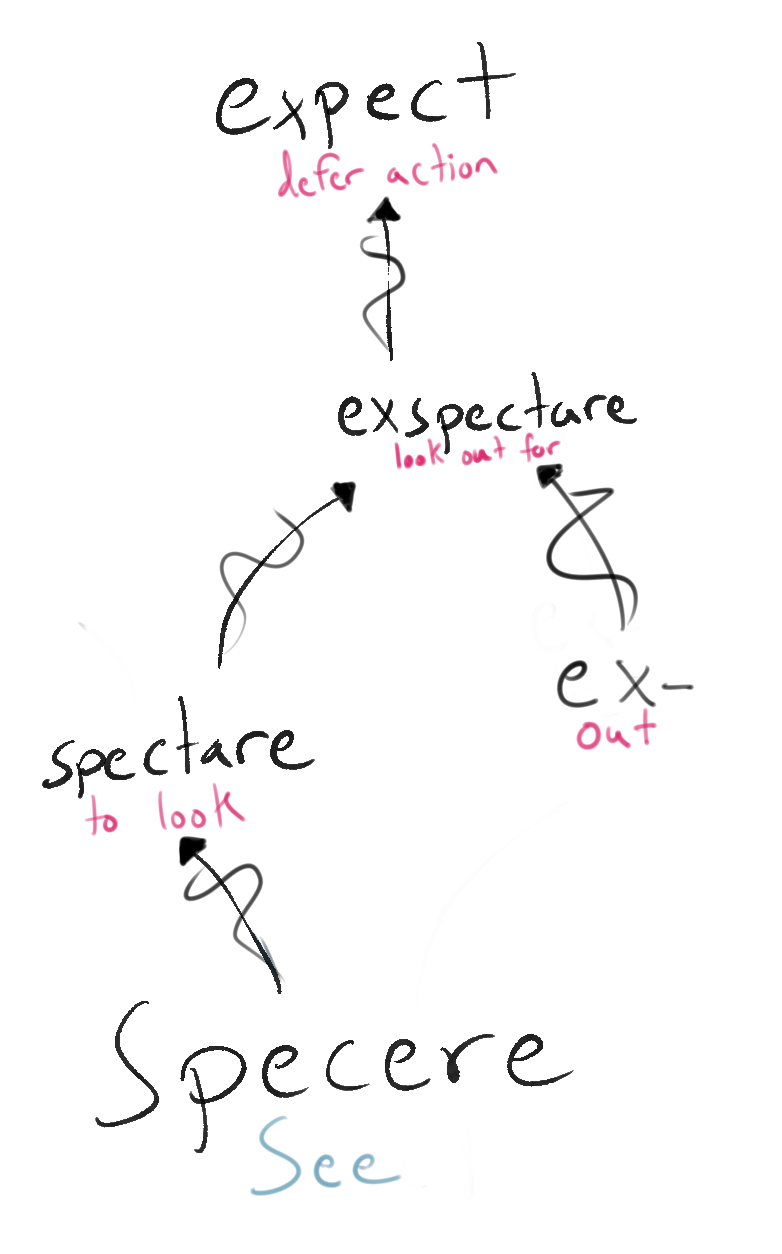
That isn't the end of the song, or Kote's... not by half.
So if we lock in Kote as expect, and we established with some certainty that Chan was Seven were left with Seven vaen edan expect. We left off with a strong argument for vaen being related to time and years, enough to ease it into that slot, which leaves edan to mean disaster.
edan also appears in
“Tetalia tu Kiaure edan A’siath,” he said in Siaru, clapping Wilem on the shoulder as he walked out from behind the desk. “Vorelan tua tetam.” ~ NOTW:427
and the phrase under question. If my wild guess about A'siath being Sithe is correct were actually not to far from translating this first part in some sense: tetalia you disaster sithe, maybe "you would make a terrible sithe** followed by "desire your tetam**. That's too much guess work though. Here are some other words to consider:
Edan appears on the map several times. Near the edges of Ceald on the ocean side: "VEDANTIS CIRADAT" and "The EDANE RETTE" Ciradat is just a curl away from a t being an e and getting Ciradae. There are 3 "Ciradat's" on that map each on coastal areas. "SEDANTIS Bay" Finally "Ven Veden" is also along the coast and every map likes to put the sea monster to the far east, Now I can't help but wonder if monsters (scrael?) or invaders came from that direction at one point. Edan being "look" or "disaster" would both support the idea that its a place to pay attention to. To be honest, having the word "see" in words close to the sea is somewhat compelling.
We should touch on the idea that kvothe is Andan~Edan~Disaster and so his choice of his new name Kote, might be to distance himself from the stigma of anger and burning. The references to the sea would now play nicely into the theme of "water with fire in it", that we have seen and I think will see again.
I suspect the translation of "Kist, crayle, en kote," is akin to "Shit and onions in my eye." or simply put, "I can't see shit". Recall that the lighting had changed in the Fishery and possible it was throwing the Masters keen eye off (TWMF:171):
I hoped the change in light was due to a new lamp. Kilvin's mood was always foul when one of his lamps went unexpectedly dark. Scanning the rafters, I didn't see any dark lamps. It took me a long moment to realize the strange quality of the light was due to actual sunlight slanting in through the low windows on the eastern wall. Normally I didn't come to work until later in the day.
Or maybe his goggles were fogged:
"Kist, crayle, en kote," he swore furiously. He threw down the metal tube where it rang sharply against the stone floor. “Kraemet brevetan Aerin!”
I fought down the sudden urge to laugh. My Siaru wasn't perfect, but I was fairly certain Kilvin had said, Shit in God's beard.
The bearlike master stood for a long moment, looking down at the ruined glass on the floor. Then he let out a long, irritated breath through his nose, pulled off his goggles, and turned to look at me.
Either way, his vision was likely obscured. On top of Kvothe wasn't at his best due to an acute case of jumping out a window, both likely played a role in the timing being off on the project. Meanwhile, by itself:
“Kraemet brevetan Aerin!”
Might be "blackened beard of god". Though the whole thing might functionally come across as "I cant see through the blackened beard of god". Though putting Aturn prudishness aside, if brevetan did lean towards the slang term for beaver, there might be some far-reaching implication.
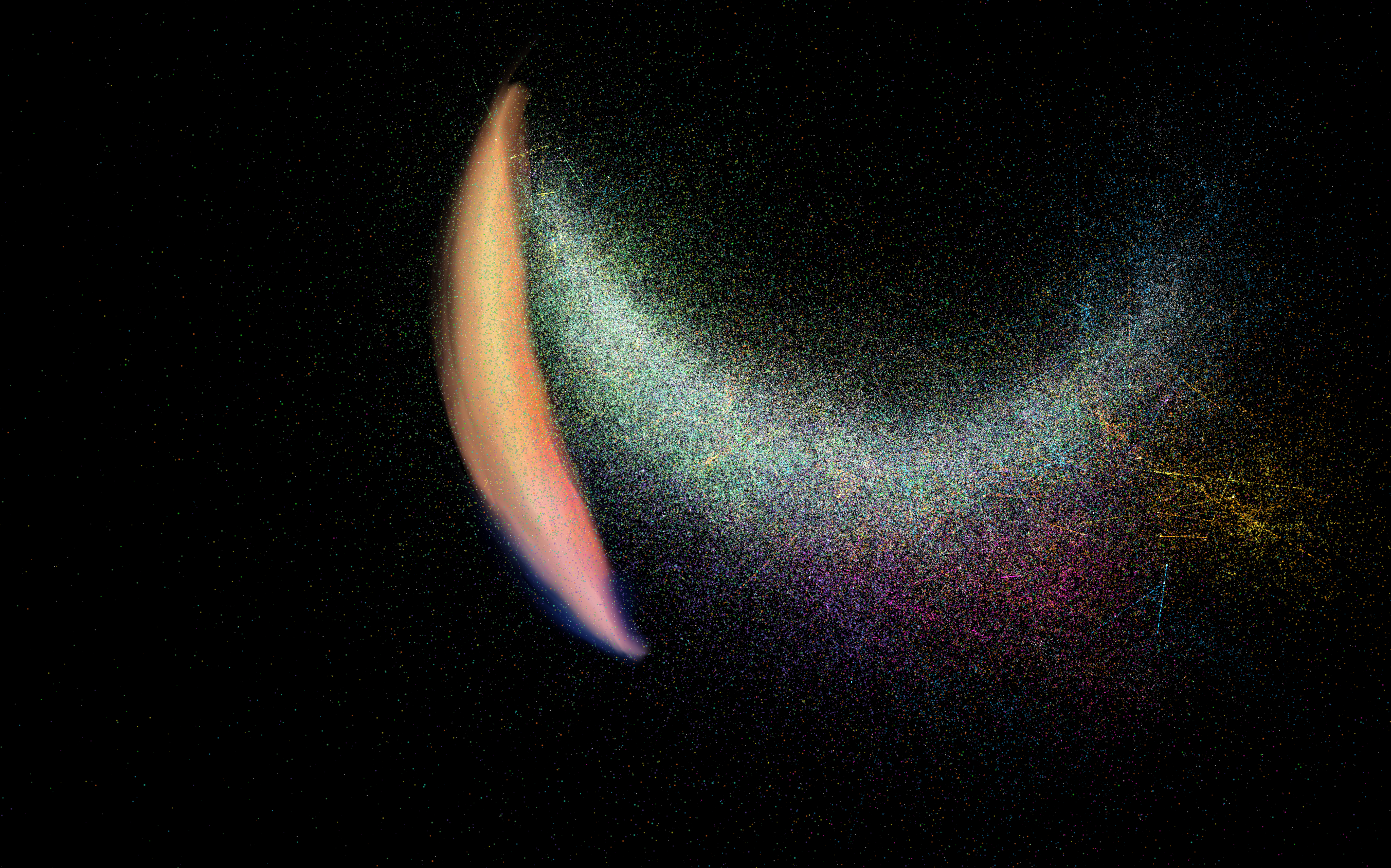
So I'm claiming that Kote, as Kilvin uses it, means "expect". In the sentence "Chan vaen edan kote" that would place the verb at the end of the sentence. A word for word swap would give us "Seven years disaster expect". It would be nice to see this language pattern repeated. Or at least that this placement isn't unusual. Let's look at some other Siaru translations. Here is Kvothe replying to Elodin:
I felt Master Elodin look at me. Actually felt it, I suppressed a shiver. “So-heketh ka Siaru krema’teth tu?” he asked. How well do you speak Siaru?
“Rieusa, ta krelar deala tu.” Not very well, thank you. ~ NOTW: 315
I might have mentioned this, but tu is likely "you", so our first try would seem to validate the idea that we can't just swap words. Language translation rarely works that way, but it would be distressing if it did work in other cases. Bonus, does "ta" mean "I/me"? Let's try another, and will leave it to the audience (you) to find a grammar for the language. Here is Kvothe talking to Roent:
I nodded solemnly. “Rieusa, tu kialus A’isha tua.” Thank you for bringing me close to your family. ~ NOTW:219
tua is likely "your". We also easily get Reiusa as "Thank you" which leaves only Kialus or A'isha. Again, word swapping would get you: "Thank you, you kialus A'isha your". Which makes no sense in English no matter how we fit our remaining words. While we're here, lets try to translate this. First off, using "tu" as "you" here is also awkward, and I wonder if it doesn't change meaning based on position. Given how are hunter Scriv uses the word "A’siath," I have a hunch "A'-" implies group or collection, so I'm leaning towards A'isha as family. The only close word to kialus is Kiaure, also used by the Scriv. It's rather dangerous to translate based off only three points however.
The point is, Siaru doesn't work like English, we shouldn't expect the words to line up, we don't know the grammar.
I should also say something about what Disaster Kilvin is referring to, or at least raise the topic. Remember he says its two years over do. So it happened nine years ago.
Manet is full of horror tales of students getting hurt, he mentions an even twenty years back where a student lost his arm. Then another, where someone cooked themselves via heat slippage. Finally, he talks about an even which would fit, as it happened 10 years back to an Artificer that Manet trained himself:
“Risky is risky,” Manet said. “I trained a fellow maybe ten years back, what was his name ... ?” He tapped his head for a moment, then shrugged. “He made a little slip.” Manet snapped his fingers sharply “But that’s all it takes. Got burned pretty badly and lost a couple fingers. Wasn’t much of an artificer afterward.”
Though it's impossible to tell if that's the specific event Kilvin is referring to. Maybe more interesting and relevant to the story is the origins of the phrase it self. Seven is a popular number in the KKC. Trip throws sevens, Savien returned to Aloine on the seventh year, Auri's seven days etc... But which would be a Disaster, maybe specific to the Siaru? I'll hedge that it relates to Tehlu catching Encanis on the seventh year. But were already over budget for theories so I'll try to flush that idea in another post.
So, expect can trace it's linage back to the word see. Kote, like Chronicler, has had his eye's opened a bit by this point and is no longer blind to the words true nature. He has truly earned the rank E'lir, a Seer. Kvothe so far has gotten away on luck, recall all the times he chides himself for ending up in a situation with no plan, resources and source? I suspect his bull-headed reckless pursuit finally caught up with his lack of preparation and he ended up changing his nature in order to avoid one type of catastrophe, only to fall into another. Out of the fryer and into the fire if you will. Kote has taken some time to reflect, and in the process, he has been planning, acting and expecting the worlds true players to come find him. He knows he is being watched, that the world has its eye on him. So, he is on stage, an actor, playing his role so perfectly it would break a heart, and fool a God.
Before we go on, lets take a break and rest our feet at the local Inn.
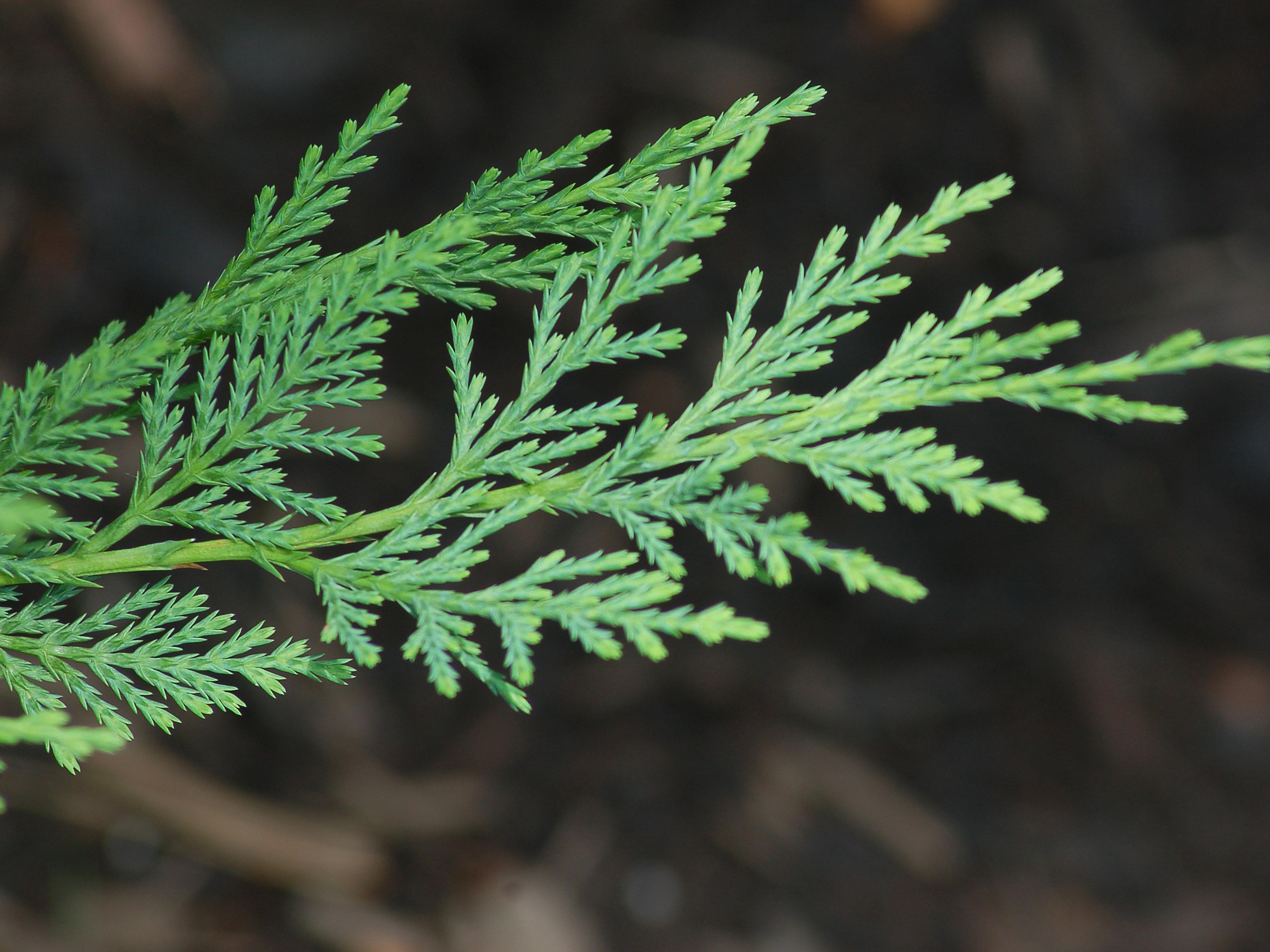
There are around 100 words with ae in them: